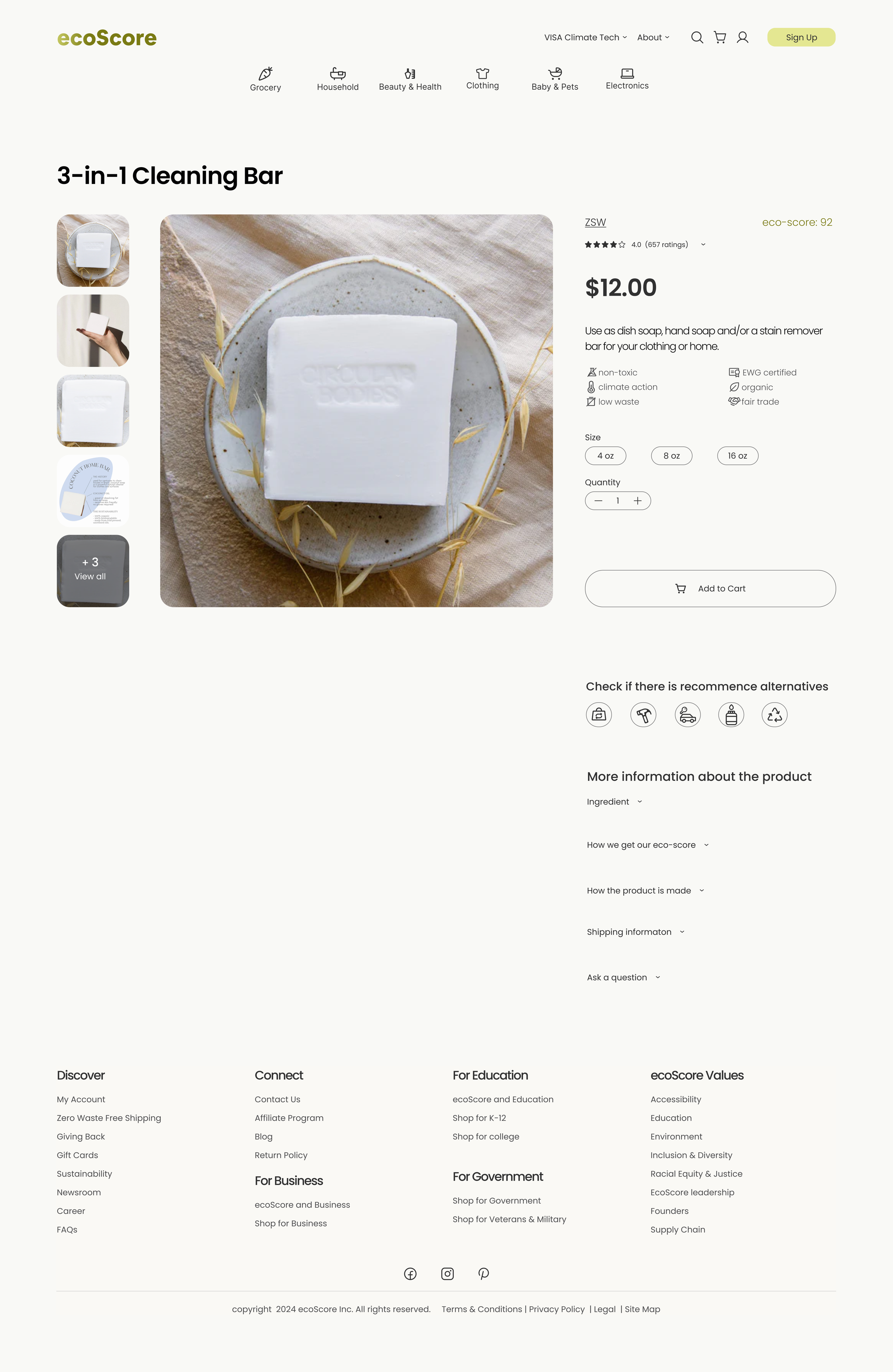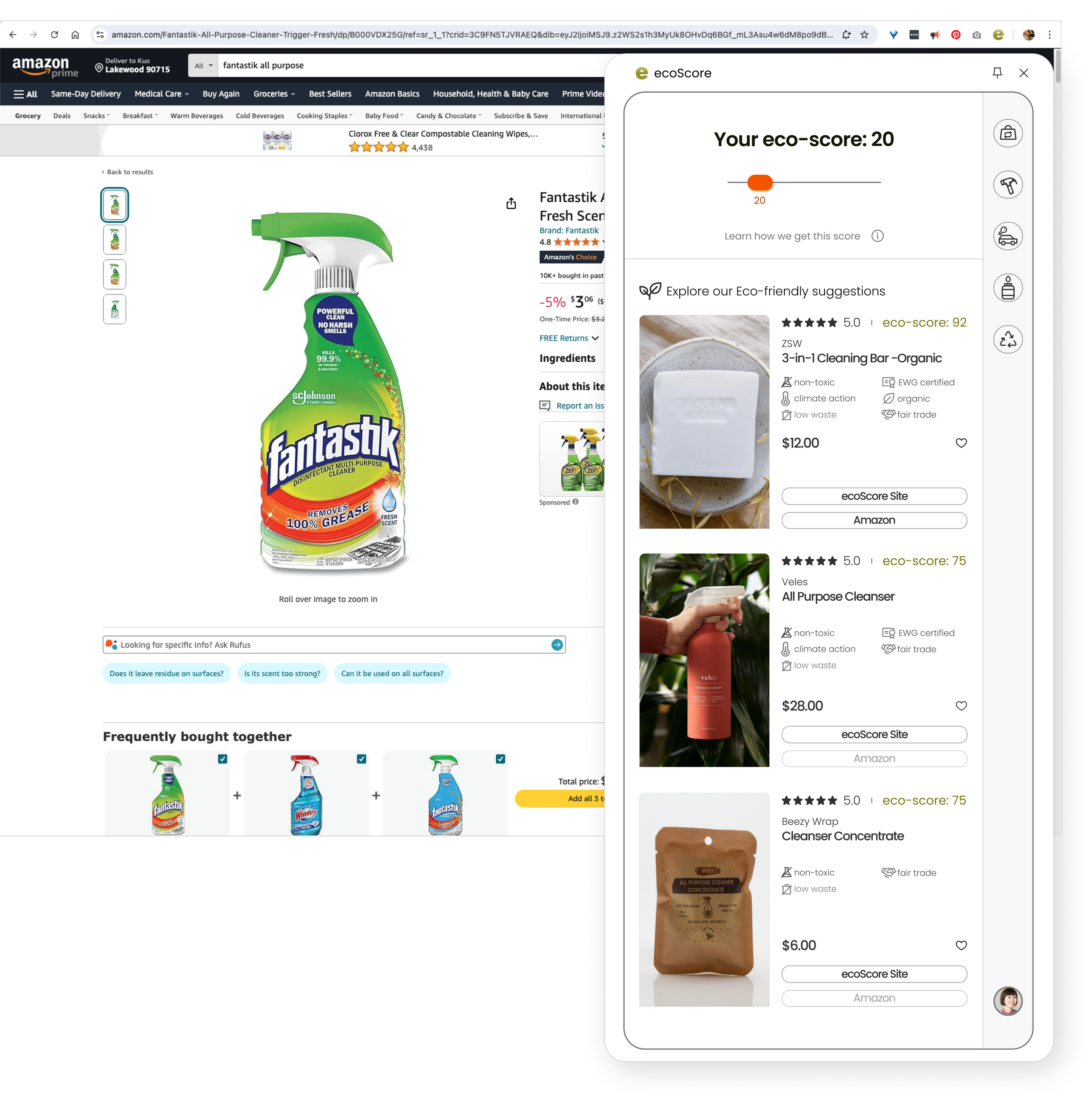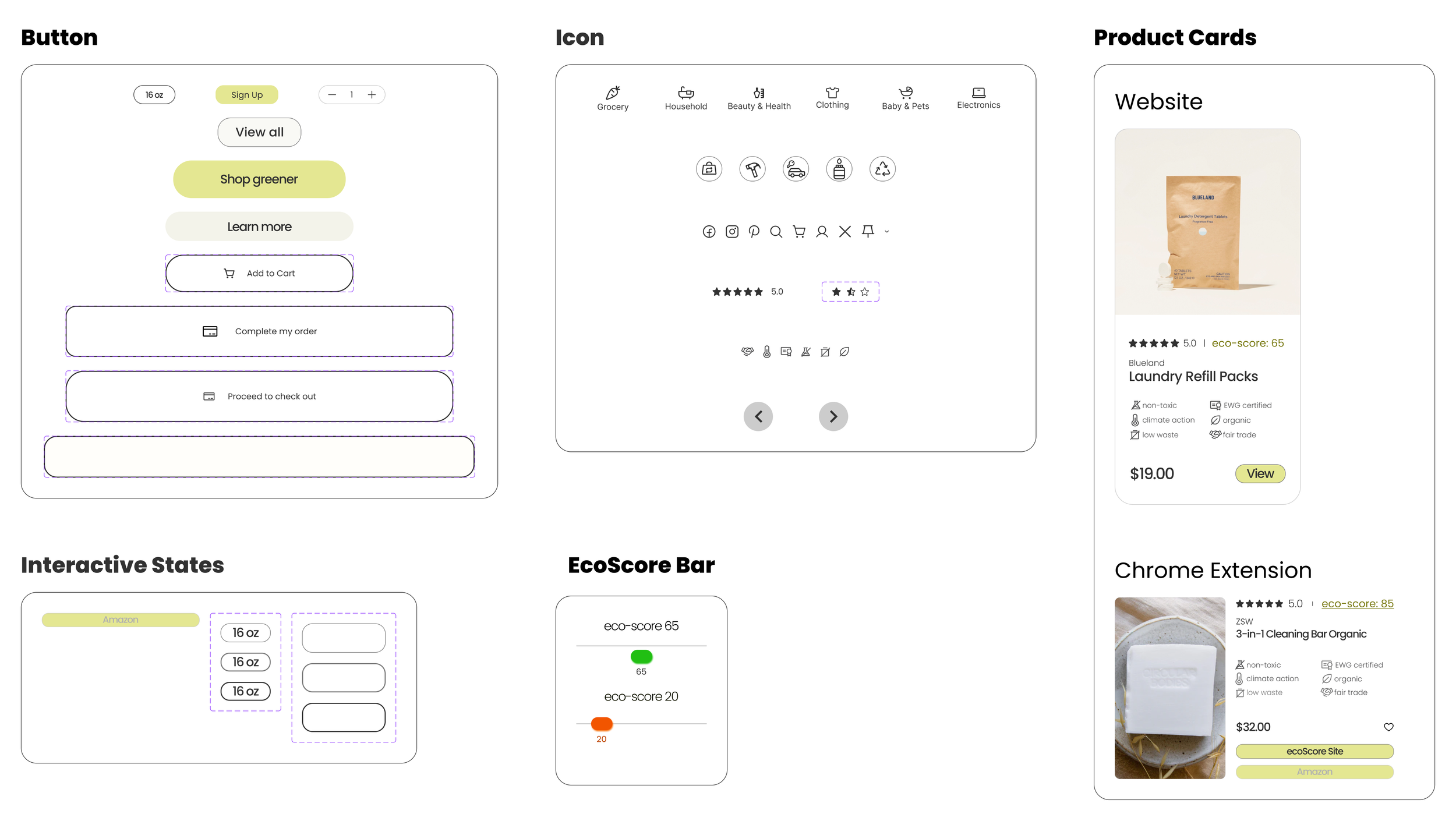EcoScore
EcoScore's Chrome extension scores items' sustainability on popular online marketplaces, guiding users to the VISA sponsored EcoScore e-commerce platform, which offers a range of more sustainable products.
My Roles
Solo UX/UI designer
Tools
Figma/FigJam, Procreate, Gform
My Team
2 developers, 1 data analyst, 1 UX/UI designer
Duration
May 2024 - Jun 2024 (3 weeks)
Index
Project Summary
Iteration
Survey & Interview
Site Map
Visa Hackathon: Revolutionizing Payment Data for Sustainable Choices
Project Brief
At the Visa Climate Tech hackathon, VISA invite the participants to explore innovative solutions that revolutionize the way VISA use payment data, creating groundbreaking solutions that enable users to make more sustainable choices.
Problem
Limited knowledge, availability, and price are the primary barriers preventing people from actively engaging in eco-friendly practices
Despite VISA data revealing significant retail spending, surveys and interviews exposed barriers hindering participation even with the interest in sustainable practices. Current eco-friendly platforms fall short in addressing these barriers due to limited knowledge, product diversity, trust-building materials, and data-driven insights, emphasizing the demand for an innovative solution to facilitate eco-friendly practices.
Prototype
Solution
Leveraging VISA finance data, we identified high-spending areas: groceries and household items. We designed a Chrome extension to rate products sustainability with raise eco-awareness and guide users towards more sustainable shopping choices and eco-friendly alternatives on our EcoScore website. We also take advantage of machine learning technology to rate each product’s sustainability on current popular platforms, following Climate Action, Environmental, Social, and Governance, Ecosystem Vitality, Sustainable Practices, Natural Well-being score systems.
Users want to participate more in eco-friendly practices but feel there's room for improvement
Current eco-friendly platforms lack essential knowledge and diverse product offerings
Platforms are also deficient in trust-building materials and comprehensive data-driven insights
Chrome extension scores products' sustainability on popular platforms
Chrome extension directs users to VISA sponsored EcoScore's eco-friendly e-commerce alternatives
Leveraging VISA data to identify high-spending areas for our ecommerce platform
Chrome Extension
EcoScore Website
Define Problem Scope
Visa users spend significantly on retail purchases, including groceries, clothing, electronics, and household items.
Analyzing VISA-provided credit card expense data, we found significant retail spending by Visa users, including groceries, clothing, electronics, and household items. With online shopping contributing heavily, we decided to focus on this area for our initiative.
Sustainable Shopping Habit Survey & User Interview
Limited knowledge, availability, and price are the primary barriers preventing people from actively engaging in eco-friendly practices
To identify areas with substantial sustainable engagement, assess overall environmental awareness, and comprehend the motivations and limitations of eco-conscious shoppers, I conducted a survey. This also aided in selecting relevant interview participants matching VISA's user demographics to obtain accurate, representative insights.
Reflection
Eco-friendly purchases are mainly driven by price, product quality, convenience, and personal benefits, while environmental concerns actually play a secondary role.
Credible information and reliable knowledge are essential building blocks for establishing brand trust.
Consumers seldom actively seek eco-friendly knowledge, despite recognizing its importance.
Competitor Analysis
Conducted competitor analysis and AI research to identify effective website organizing strategies
Guided by user interview insights and VISA credit card shopping data, I focused on creating a platform offering diverse household items, groceries, and educational materials to establish brand trust. Through extensive research using including but not limited to forums, white papers, and AI, I identified competitors in this space: Ecowiser, EcoRoots, Grove, GreenSeal, EcoCentric, and EarthHero.
Site Map
Before: Apple inspired design which doesn’t fit grocery product shoppers
Brand Design and UI Kit
Usability Test
These eco-friendly brands emphasize a natural and earthy aesthetic.
Half of them focus on academic research-driven approach, educating, and empowering consumers to make greener choices and brand loyalty.
They all curated selection of environmentally conscious products
Eco-Score site was built based upon high-spending areas in VISA data and competitor analysis research
Utilizing VISA finance data and competitor analysis, we structured EcoScore's ecommerce platform to target high-spending areas, optimizing user experience and driving growth.
Brand Design & UI Kit
Airbnb Cereal, Poppins, earthy green, and blue, were chosen to evoke a sense of nature, health, and eco-consciousness
To align with user preferences for natural materials and sustainable purchases, I chose earth-toned green and blue for their calming effects and associations with nature, health, and balance, resonating with products that are not only better for the environment but also for their well-being. Airbnb Cereal and Poppins were chosen for their modern geometric sans serif design, rounded letterforms, even spacing ensure familiarity and accessibility.
Users are excited about the Chrome extension design, pleased with the aesthetic and eager to learn more eco-friendly knowlege through the site
Usability Test
Moderated usability tests with five participants were conducted via Google Meet to evaluate EcoScore's usability and effectiveness. Key goals included identifying task completion barriers, pinpointing user pain points, and gathering user feedback on the product's overall functionality, visual design, and user flow efficiency for the Chrome extension, website, and purchase process. Please click the links for Usability Test Plan; Usability Test Report; Usability Test Affinity Map.
After: Smaller product image fit the screen size better with more product eco-friendly labels
Smaller and more product images
Time constraints prevented the development of an eco-activity tracking system, which could have further enhanced user engagement and environmental impact monitoring
Improve team efficiency by: clearly defining roles, creating a detailed timeline, assigning a minute-taker for meetings, and documenting all plans, progress, and feedback in written formats for better collaboration and accountability, particularly with development and implementation tasks.
Over-emphasis on implementation led to inadequate attention on slide presentation; better balance between the two aspects is essential in the future.
Provide sustainability labels
Assess overall functionality and visual design of the site and Chrome extension
Evaluate user flow efficiency through completion rate and task completion time for EcoScore Chrome extension and purchase process on Eco-Score website
Identify successful eco-friendly e-commerce strategies and best practices
Uncover potential market gaps and opportunities for differentiation
100% of users love the idea of Chrome extension and think it integrates into their original shopping flow well
100% of users love the favicon, logo, color theme, and the minimal aesthetics
100% finish EcoScore Chrome extension task flow within 1’ 05” and purchase process within 1’ 20”
20% users want to see more eco-friendly related information
Iteration
Identify regions with significant sustainable engagement
Understand the driving factors and barriers for eco-conscious shoppers
Assess general environmental awareness across the target audience
Adding more product images and eco-friendly labels
Product image is too large

















